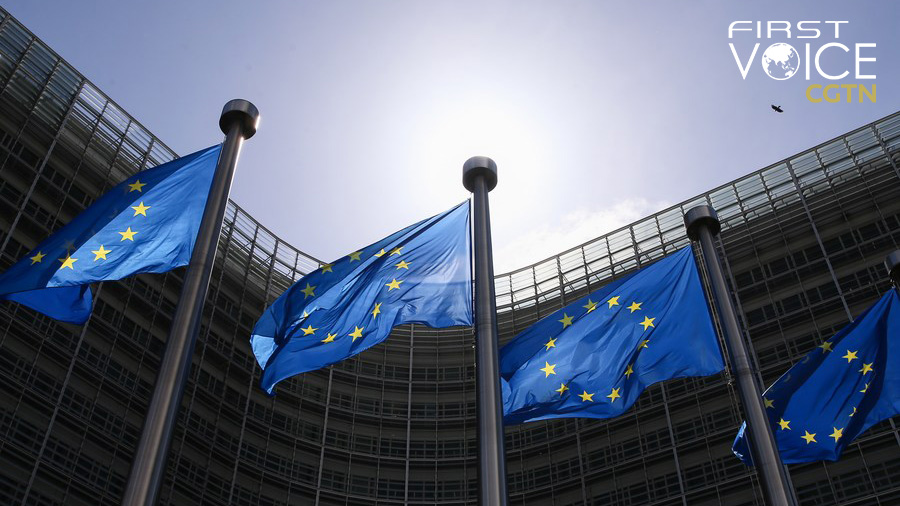
Editor's note: CGTN's First Voice provides instant commentary on breaking stories. The column clarifies emerging issues and better defines the news agenda, offering a Chinese perspective on the latest global events.
Between the two behemoths called China and the United States, lies a Europe trying to find a balance.
This is the reality for today's Europe. President of the European Council Charles Michel met with Chinese President Xi Jinping on December 1, saying that EU stands ready for in-depth discussion with China on important issues concerning various aspects of EU-China relations and that it’s ready to become a reliable and predictable cooperation partner for China.
Meanwhile, the Dutch Minister of Economic Affairs and Climate Policy Micky Adriaansens rebutted U.S.'s pressure on restraining high-tech exports to China, insisting that her country and Europe "should have their own strategy."
At the same time, French President Emmanuel Macron was in the United States rubbing shoulders with U.S. President Joe Biden, criticizing the country's Inflation Reduction Act as "super aggressive" toward European companies while issuing joint statement, aligning the country with U.S.'s geopolitical rhetoric.
As President Michel told President Xi during their meeting, the EU pursues strategic autonomy. Even though it might have been considered as appeasing diplomatic rhetoric by some people, it's increasingly a proven reality, especially when it comes to the 27-nation bloc's relationship between China and the U.S.
China remains EU's largest trading partner. In the first 10 months of 2022, trade value between the two grew by 6.3 percent year-on-year, reaching $711.4 billion. In the first eight months, EU's Foreign Direct Investment into China surged by 123.7 percent year-on-year. Jörg Wuttke, the President of European Union Chamber of Commerce in China, told the Global Times that European businesses hope they can "do more given the size of the Chinese economy." Michel said in his meeting with Xi that EU will work with China to push forward to process toward an EU-China investment agreement.

Chinese President Xi Jinping holds talks with visiting President of the European Council Charles Michel at the Great Hall of the People in Beijing, capital of China, Dec. 1, 2022. [Photo/Xinhua]
But, as Macron's visit to the U.S. showed, despite growing fissures between Europe and U.S.'s objectives and the Europeans bearing the brunt of the energy crisis, European security is still fundamentally reliant on U.S. powers. As German Chancellor Olaf Scholz recently said in a joint press conference with NATO Secretary-General Jens Stoltenberg, NATO "is and remains the central guarantor of our collective security." Even though Macron has expressed objections to NATO making China a central target, his joint statement with Biden shows that a Europe whole, free and at peace entails "maintaining our nations' collective defense and security, including through NATO."
It's not a traditional money versus security dichotomy. U.S. is EU's second largest trading partner. Its No. 1 status was overtaken by China only in recent years. And Europe also looks to China to mediate in the Ukraine conflict, as Macron said during this year's G20 summit. Europe's relationships with China and the United States are interweaved across security, economy and other aspects. Picking either one could be disastrous for Europe's future development. It is a difficult tightrope to walk on.
President Xi told President Michel, it is important to properly manage differences. China and Europe differ in history, culture, development level and ideology. Having differences on issues is only natural. "It is essential to respect each other's major concerns and core interests, especially sovereignty, independence and territorial integrity, and refrain from interfering in each other's internal affairs, in order to jointly preserve the political foundation of China-EU relations," Xi said.
Here, the ask is simple. China doesn't want the EU to choose sides, but see the relationships through a respectful and pragmatic lens. Leaning on a greater power and bandwagon its policies would feel easier, but it would not benefit Europe in the long run. EU has to stand on its own, even if the tightrope feels impossible to stay on at times.

 中文
中文



